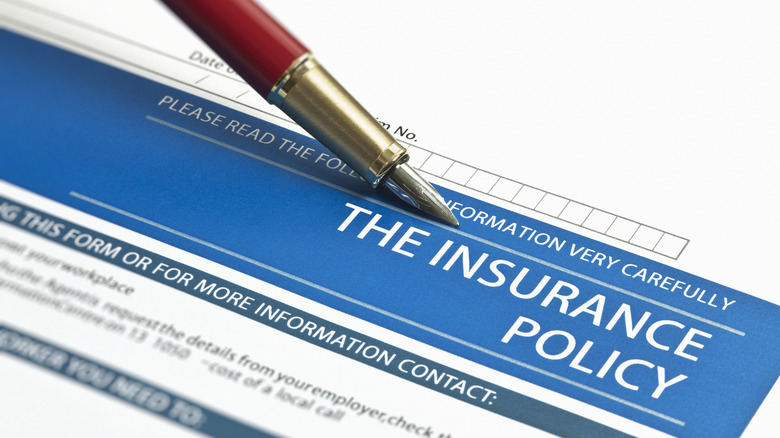13 Sneaky Ways Insurance Companies Trick You Into Spending More Money
Dealing with insurance companies is an unavoidable part of life. Whether you're talking about health insurance, home insurance, auto insurance, or anything else, at some point in your life, an insurer is going to be protecting your most valued assets. Of course, nobody wants their home to burn down, but it would be downright silly on your part to not insure your home. As a result of the necessity to insure certain assets, insurance companies tend to make out like bandits in their insurance contracts.
Just as restaurants deduct the cost of operating from the meals they sell to produce a profit, insurance companies deduct their insurance payouts from their overhead to make their money. Bottom line, the success of the business model relies on the avoidance of paying insurance claims as much as possible, while also raking in profit from your premium payments and betting against the sort of hardship that would jumpstart an insurance claim in the first place.
Like a Vegas card shark, insurance companies like to hedge their bets. A thorough vetting of potential clients is standard, so if you were seeking life insurance coverage that ended at age 70, the insurance company is definitely going to want to discuss your medical history and likely even require a physical. That said, this isn't the only way an insurer will set the odds in their favor, but there are a few ways to avoid being tricked into spending more money than you should.
Hustling your employer
If your workplace offers health insurance as part of your employment, you may already be handing a bigger slice of your paycheck over to the insurance company than necessary. It starts with the incentives for insurance brokers to sell policies to employers, with everything from 40% to 50% in cold hard cash commissions to a chance to square up against the pitcher of a World Series-winning baseball team, as motivation. Since your HR department has an interest in working with an insurer to provide employees with health insurance, and the broker has an interest in making as much money as possible in commissions and bonuses, this all leads to a perfect incentive to upsell insurance policies to your employer. That upsold commission comes from the premiums you pay.
Worse still, even though some companies are catching on to this hustle, it's virtually impossible for companies to find out where their money is going. Both companies and unions are asking questions about rising premiums — according to HealthAffairs, insurance rates are higher than the cash cost at hospitals 53% of the time — overpaid medical bills, and murky details about how much money is actually getting spent and why. With the yearly cost of insuring a family hitting a median of $22,000, higher deductibles could be eating up more of your paycheck than necessary.
Raising premiums without raising payouts
With home insurance inflating 50% and auto insurance racing up by 17% in recent years, it's fair to question whether or not anyone gets what they pay for, even when you file a legitimate claim. Thanks to price optimization, a practice whereby clients' feasibility is determined by what the insurer believes they can afford as well as other justifiable metrics like risk or demographics, nobody can really be sure that your premium is going to pay for itself. Drones, tracking devices, nutrition tracking data, and even your social media can all be plugged into software to determine your place on the premium scale. Activating your auto insurance policy can result in higher premiums going forward — almost definitely if you share any fault — and if that claim comes in too late, you could even lose your insurance altogether. Insurance companies are pointing toward inflation as a reason for rising insurance premiums, with insurance rates for even further types of insurance rising between 12% to 20% in the U.S.
Credit insurance
The Office of the Insurance Commissioner Washington State (OIC) explains that credit insurance protects your credit rating in the case of losing your primary source of income through a loss of employment or illness. It kicks in by making your regular payments owed to a lender or financial institution on your behalf. Of course, if you never need it because you have stable employment, don't find yourself injured and off the job for any significant amount of time, or already have disability coverage unrelated to credit specifically, it could just be an unnecessary expense. The premium you pay to protect your credit can also become part of the debt itself since your insurance premium will get lumped into the loan premium. This means you're not just making interest payments on your loan or credit card, but you're also paying interest on your insurance premium. If you already have insurance that protects you from loss of wages due to injury or illness, that will actually cost you less than paying for credit insurance and will do the same job.
Cellphone insurance
Since most people in the U.S. own a cellphone, and insurance companies are always on the lookout for new products to sell to the public, it makes sense that cellphone insurance would be on offer. When you consider that 77% of citizens between the ages of 18 to 29 and 74% between 30 and 44 have broken their phones, or that a cell phone is stolen every second, the argument in favor of cellphone insurance gets louder.
However, there are a few things to consider, starting with the monthly insurance premiums that become an extra bill. Over two years, this can total anywhere from $100 to $200, while repairing damage to your phone could still run you a deductible in the ballpark of $300, even if the phone you broke is an old model. Worse still, the loaner phone most insurers offer until those repairs are made is usually refurbished. If you have a limited number of claims you can make, you'd better hope you're not clumsy or a repeat target for theft because if you've exceeded your coverage limits, you'll be stuck covering the bill for a new phone anyway.
ID Theft insurance
USAGov describes identity theft as "when someone uses your personal or financial information without your permission," which can "damage your credit status and cost you time and money." It typically occurs by getting access to your personal information through outright theft of cards, online phishing through social media browsing, texts, phone calls, or fraudulent emails, and even rummaging paparazzi-style through your garbage.
However, most theft ID protection companies offer to monitor your credit, change of address, credit reports, Social Security and ID numbers, and social media as part of a packaged strategy to protect your ID from manipulation or theft. Many of these service providers rely on insurance companies to cover your losses. Complete ID, for instance, offers up to $1 million of identity theft insurance, with LifeLock's prices ranging from $9.99 to $29.99 per month. What none of these companies tell you is that you can do all of this monitoring on your own through credit report requests, consumer reports, and browsing government databases. None of these services actually protect your information, they just report suspicious activity after the theft has already happened, and when it comes to things like home or auto insurance, fraud protection is usually offered in the insurance policy.
Flight insurance
Typically, flight insurance covers the cost of airfare in the case of your flight being canceled for any unforeseen reason. There are certain situations where flight insurance is unnecessary. If you're flying domestically, take a look at your medical insurance to see if you may already have coverage for lost trips. Depending on your credit card provider, you may also have travel insurance baked into your service with lenders like Chase and Citi, if you bought the ticket on your credit card. It's not an add-on you need to pay extra for like an insurance premium, but it could be just as useful if you need it, without paying an extra premium through an insurance provider. The last thing to consider is that while airlines aren't on the hook to compensate you financially for lost flights, most airlines do allow for seating on the next available flight out.
Child Life Insurance
Although it's difficult to think about, if your child were to become chronically ill or worse, the additional coverage could be of benefit to you and your family. In the worst-case scenario, the cost of a funeral would be offset by insurance coverage. Because of their age and decent health standing, premiums are generally affordable. Insurance coverage premiums for kids begin at about $13 to $24 per month for up to $50,000 worth of coverage, landing between $18 to $35 by age 10. However, there isn't much flexibility in these plans. Aside from those factors, $50,000 may not be all that much by the time your child is an adult or at an age when they actually need the insurance coverage. The cost of college being what it is, it might make more sense to invest the premium payments into an education or long-term investment fund instead.
Rental car insurance
A simple car rental always becomes an experience in upselling rental insurance. You're already on edge about car theft or damage to the vehicle and envision yourself having to pay for it out of pocket, and the salesperson knows that. The most popular insurance types — loss damage waiver insurance, liability insurance, personal accident insurance, and personal effects protection — can set you back anywhere from $5 to $20 per day. If you drive, you should already have car insurance that covers most of that, and if you don't, just as in the case of flight insurance, your credit card company may already automatically have rental car insurance as part of the card's perks. The most well-known companies, Amex, Visa, Mastercard, and select Discover cards, offer some version of protection. As for personal accident and personal effects protection, run-of-the-mill health insurance, home, or renters insurance should also cover those situations. There is one caveat, and that is if you don't already have auto insurance, coverage through a credit card company, or home and renters insurance, then rental car insurance makes sense.
Personal injury protection
In the case of an automotive accident where you or your passengers suffered an injury, personal injury insurance would cover time off work and medical expenses. 15 states require this coverage in order to drive, the others put the onus for this coverage on you. But if you already have personal injury protection as part of your health insurance policy, paying an insurer for that specific service would be like double dipping in the insurance company's favor. However, if this isn't part of your coverage and you reside in a state where personal injury protection is either optional or not a necessity, then it's something you should have. However, this coverage doesn't extend to the other automobile or their passengers, but bodily injury liability, also required by law in most states, will protect you from lawsuits arising from the accident in states where no-fault insurance doesn't apply.
Comprehensive coverage
Comprehensive coverage isn't actually comprehensive since it only covers damage to your vehicle that doesn't have anything to do with traffic, including freak accidents like a tree in your yard falling onto your car in a storm, civil unrest and riots, or the neighbor's pesky kid driving a flyball through your windshield. Typically, anything traffic-related would be covered by collision or liability insurance. Obviously, coverage for these sorts of unforeseen circumstances could be important if you have a brand new car, or a vehicle difficult to source repair parts for.
However, comprehensive coverage only covers the value of your vehicle, so if you're driving a beat-up lemon that can be repaired with spare parts in any mechanic shop, it might not be worth the cost to have comprehensive coverage. Really, comprehensive coverage should only be factored into your insurance coverage if you're leasing a vehicle or the thought of paying for any damage to it out of pocket keeps you up at night.
Pet insurance
Like their human counterparts, pets are also being sold health insurance for the coverage of medical procedures, medications, shots, and any other expense associated with health. Like with people, the cost of surgeries and medications can get expensive. There are around 65 million dog-owning households and 46 million households with cats, but only 4.8 million are insured.
Most wellness policies only offer roughly $300 worth of coverage, with average yearly medical expense for a pet can creep up to $400 for dogs and $200 for cats. But this doesn't include the cost of treating chronic illnesses like diabetes, heartworm treatments, or surgeries that can run an owner anywhere from $1,000 to $7,000. You'll also still need to cough up the cash upfront before an insurer will reimburse you, and even before your pet qualifies for insurance it may be expected to undergo a physical that can easily run you $600 to $1,200. So pet insurance doesn't actually cover a substantial amount of expenses and you'll usually have to pay at least 80% upfront anyway.
Slipping something into the fine print
It's smart to go over your insurance policies with a fine tooth comb. Terms like definitions, defense costs, firm obligations, and exclusions are words that you ignore at your peril because they could mean the difference before getting covered as expected, or getting a nasty surprise when you try to activate the policy. For example, an exclusion could mean your coverage being denied by an insurance company if there was a clause suggesting your coverage became null and void if you were found at fault or negligent for some action. Many life insurance policies exclude payout for death caused by self-harm or if it occurs while in the process of committing a crime.
There are particular things you need to look out for in the insurance contract, usually having to do with six factors. Rules around pre-conditions or previous health conditions that could have led to you trying to activate your health insurance policy are common. Many life insurance policies require you to be a policyholder for at least two years before they will pay out anything other than your return of premium plus interest.
High-deductible health insurance
In the '90s, insurers typically covered as much as 95% of patients' health care costs, but as the early aughts brought rising health care costs at a skyrocketing rate of 6% per year, insurance companies devised a way to remain profitable. Enter, high-deductible health insurance, a scheme where insurers offer employers health insurance benefits with higher premiums levied against their employees than ever before, with 51% of employee policies in the U.S. costing upwards of $6,650 for a single person or $13,300 for a family. They're able to give employers an edge by discounting premiums and passing on the cost to you in the form of higher deductibles. This raises prices for patients, who then tend to put off life-saving diagnoses due to cost, while a $10 upfront increase in medications has been shown to negatively impact whether patients access prescription drugs, leading to a 33% rise in unnecessary deaths.
How not to get hustled
Jot down all your insurance coverage and what those monthly premiums are costing you. Then, cancel unnecessary insurance by calling the company and requesting a confirmation email or code. When it comes to home and auto insurance, most policies allow you the option to cancel and shop around for better rates and options. Scenarios like an improvement to your credit score, moving to another state, or even upgrades to your home that make you eligible for a discount elsewhere can all positively affect your quote. If you have a credit card, research what insurance benefits you have offered. You may find that everything from rental car insurance to travel or flight insurance is already included.
Every year, from November to mid-December, an open enrollment period for insurance under the Affordable Care Act allows you to change your policy or insurer. If you receive health insurance through your employer, research your open enrollment period as they may not be the same. If the thought of damaging or losing your phone keeps you up at night, go with an iPhone and sign up for AppleCare, Apple's extended warranty program. It offers limited repairs every two years and tech support at competitive prices to insurance companies.














